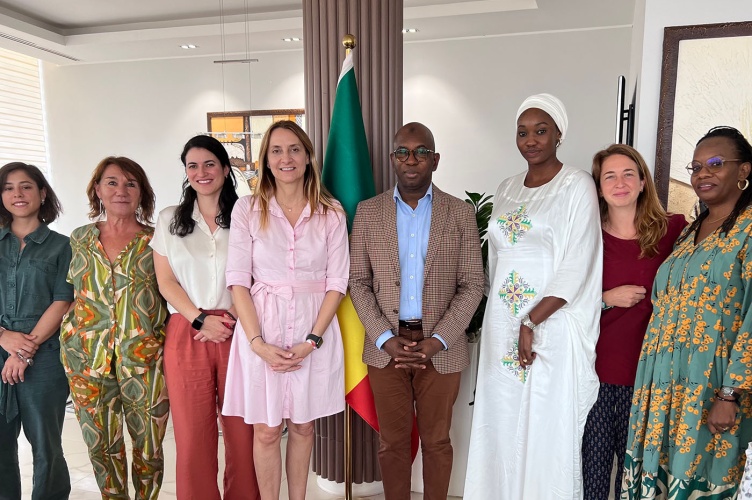2024: The local realities
A transformative journey for Professorship RIUxESCP
The RIUxESCP Professorship continues its course with a plan of action brimming with content. Proof of this is that we haven't stopped in 2024.
In addition to going to RIU Headquarters in Palma de Mallorca for our annual RIU-ESCP planning meeting, we started the year by traveling to Aveiro, Portugal, for the Twentieth International Conference on Environmental, Cultural, Economic & Social Sustainability (January 24-26, 2024) to present the RIU Method to a multidisciplinary audience. This audience showed great interest in “El Método RIU”, which allows RIU Hotels & Resorts to design its social investment strategy based on the specific needs of the local community near its hotels.
Refining the Method: An Evolving Approach
The ESCP team has been deeply involved in refining “El método RIU”, as it is conceived as a tool in constant evolution. In this way, the “on going” analysis of the various phases and stages is a maxim to enhance its effectiveness and ensure it better aligns with the contextual realities, being an ad hoc tool in each of the tourism destinations/sites in which the hotel company operates.
In the first year of the professorship 2022, we visited Cancun to review Phase 3: Execution, specifically testing a Results-Oriented Monitoring System that would optimize ongoing social investment projects in this Mexican tourism site. Since mid-2023, we have been immersed in reviewing Phase 1: Diagnosis, aiming to understand the issues faced by local communities within RIU's strategic lines (Childhood and Biodiversity) and in line with the company's focused SDG goals. The challenge is to outline the initial realities so that the social investment projects funded or initiated by the company have a positive medium- and long-term impact on the prioritized needs.
Fieldwork in Senegal: Diagnosing and Designing Social Investment
In recent months, we designed a tool to facilitate this diagnosis by destination, but any desk work must be tested in reality to ensure its relevance. Therefore, we traveled with the social investment coordination team from RIU's CSR department to Pointe Sarène, Senegal, where the RIU Baobab Hotel is located, to validate the main issues mapped during the desk work of Phase 1: Diagnosis of the RIU Method through on-the-ground work in a "new destination-emerging destination" for the hotel company, and to start designing a social investment project in this destination, aligned with the community's needs.
The agenda for the 10-days trip to Senegal at the beginning of June was very intense. It started with an ESCP & RIU team internal and participatory workshop where we fine-tuned the final on-site agenda, presented our work plan, and reviewed and discussed the preliminary diagnosis and pre-identified problems of Senegal. The collaboration and exchange of ideas were intense but necessary to ensure our interventions had the greatest possible impact.
On the field trip we had the chance to “taste” and get to know first-hand the socio-economic realities of the nearby communities. As some examples, we went to Mbour to visit the NGOs "Por una Sonrisa en África" and "Kassumay." These visits gave us a direct insight into the challenges and successes of these organizations and the reality of Senegal from the perspective of third-sector entities working near RIU, enriching our understanding on the ground.
That field work allows us to compare and ratify local realities, with an internal diagnosis, conducting interviews with various RIU Baobab staff members who completed a questionnaire and later engaged in a dialogue-debate on open questions. Their perspectives were invaluable in validating the pre-identified issues regarding childhood (health and education) and beginning to draft a preliminary project proposal to structure social investment in Senegal.
From Fieldwork to Project Design: Shaping the Future
These preliminary proposals were shared with local, regional, national, and international institutions to ensure they aligned with their understanding of the issues on the ground in terms of child health and education, as well as public policies in this regard. To this end, we met with the chief of Pointe Sarène, other community leaders, the Spanish Cooperation and Embassy, the Ministry of Education, the Ministry of Health, the Malicounda Mayor's Office (to which Pointe Sarène belongs), SAPCO (the entity responsible for the country's tourism development), and Urgences Saly (the reference healthcare service for Pointe Sarène and surrounding areas). We also visited schools and the health post in Pointe Sarène. These frenetic visits were essential for understanding current policies and programs and how our proposals could complement them.
The fieldwork concluded with a dynamic and participatory workshop where the ESCP and RIU teams reflected on lessons learned, validated identified problems, and proposed concrete solutions. It was time to finalize our projects and agree on the next steps. The conclusions from this intense week would form the basis for the final design of the project RIU Hotels & Resorts would implement in Senegal.
Looking back, each day of this field work mission was filled with learning and discoveries. The meetings, workshops, and visits allowed us to build a deep understanding of Senegal's needs and potentials. It was a transformative journey that has enabled us to improve the support tools of the “Método RIU” and prepare for the second half of this promising 2024, which we will tell you about soon. See you in September with more “Método RIU”!
Campus
